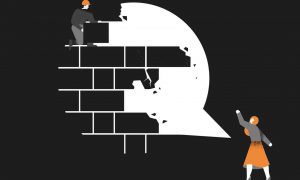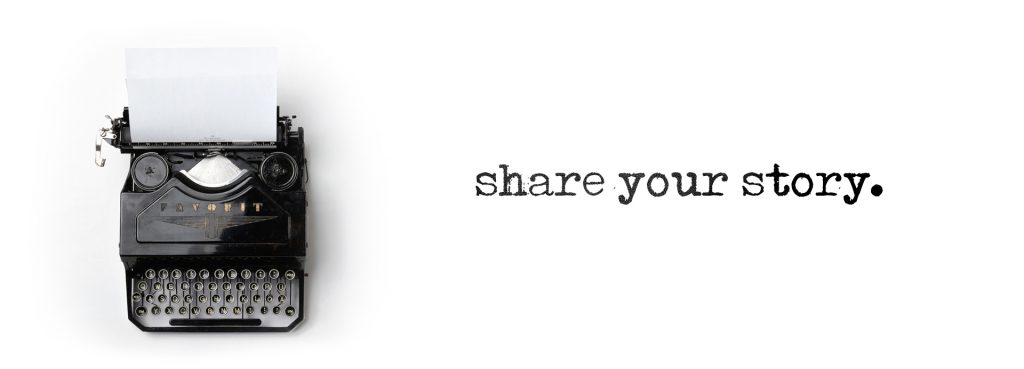
Being unable to tell your story is a living death, and sometimes a literal one. If no one listens when you say your ex-husband is trying to kill you, if no one believes you when you say you are in pain, if no one hears you when you say help, if you don’t dare say help, if you have been trained not to bother people by saying help. If you are considered to be out of line when you speak up in a meeting, are not admitted into an institution of power, are subject to irrelevant criticism whose subtext is that women should not be here or heard.
Stories save your life. And stories are your life. We are our stories; stories that can be both prison and the crowbar to break open the door of that prison. We make stories to save ourselves or to trap ourselves or others – stories that lift us up or smash us against the stone wall of our own limits and fears. Liberation is always in part a storytelling process: breaking stories, breaking silences, making new stories. A free person tells her own story. A valued person lives in a society in which her story has a place.
Violence against women is often against our voices and our stories. It is a refusal of our voices, and of what a voice means: the right to self-determination, to participation, to consent or dissent; to live and participate, to interpret and narrate.
Sometimes just being able to speak, to be heard, to be believed, are crucial parts of membership in a society
A husband hits his wife to silence her. A date rapist or acquaintance rapist refuses to let the “no” of his victim mean what it should, that she alone has jurisdiction over her body. Rape culture asserts that women’s testimony is worthless, untrustworthy. Anti-abortion activists also seek to silence the self-determination of women. A murderer silences forever.These are assertions that the victim has no rights, no value – is not an equal.
Having a voice is crucial. It’s not all there is to human rights, but it’s central to them, and so you can consider the history of women’s rights and lack of rights as a history of silence and breaking silence. Speech, words, voices sometimes change things in themselves when they bring about inclusion, recognition: the rehumanisation that undoes dehumanisation. Sometimes they are only the preconditions to changing rules, laws, regimes to bring about justice and liberty.
And then when words break through unspeakability, what was tolerated by a society sometimes becomes intolerable. Those not impacted can fail to see or feel the impact of segregation or police brutality or domestic violence; stories bring home the trouble and make it unavoidable.
Click here for the full excerpt.
Transcendent Media Capital
At Transcendent Media Capital our vision is to create a safe place where people can use story-telling to heal conflict and contribute to productive problem-solving globally. We develop our own global campaigns which combine a range of media assets and grass roots action as well as collaborations with NGO’s globally to inform, educate, challenge myths and stereotypes and to create practical projects that contribute resources to solving issues globally. One of our current main projects is “Free Yourself Global: Healing Families; Ending Domestic Violence” : a global domestic violence campaign which explores the enculturation of violence through families over generations, and endeavors to answer the question, “how does one, whether the abuser or the abused, interrupt the pattern of violence?” This initiative hopes to bring together all of the voices of the participants of domestic violence, including recovering abusers, victims, children, educators, support agencies and health professionals, law enforcement agencies, politicians, celebrities and social entrepreneurs who work to aid in this cause. It is in this aim that “Free Yourself” inspires us. When all stakeholders come together in a grass roots forum, we strengthen our ability to understand, address, and end the cycle of domestic abuse.
Whether you are a recovering abuser, victim/survivor and/or professional etc. who works to aid in this cause, we want to hear your story. You can share it with us on social media using the hashtag #FreeYourselfGlobal or anonymously here, via our website. For more info on how you can choose to tell story and how it will be used to help other people in need, or to learn how to become involved in other ways with this breakthrough campaign, email info@freeyourselfglobal.com. To simply keep up to date on our campaign and the latest news pertaining to domestic violence worldwide make sure to follow us on Facebook and Instagram.

